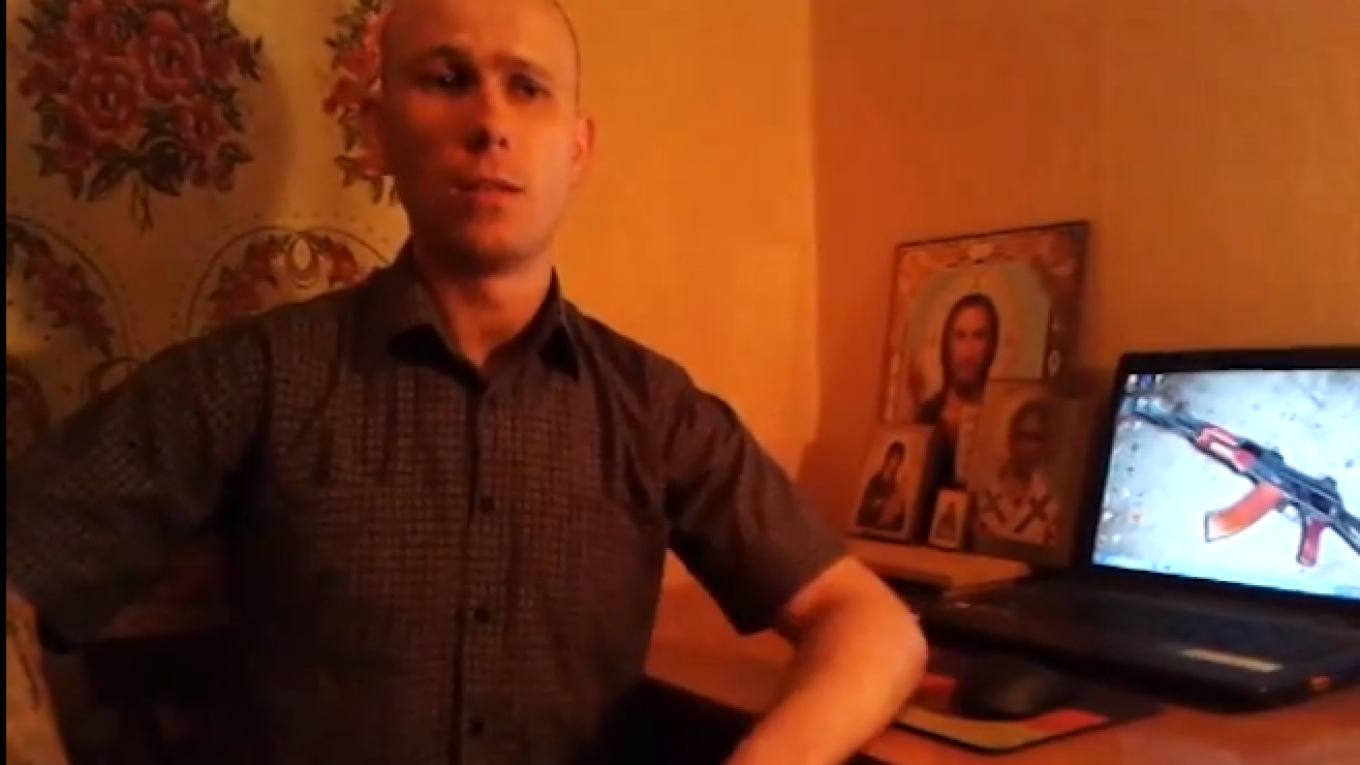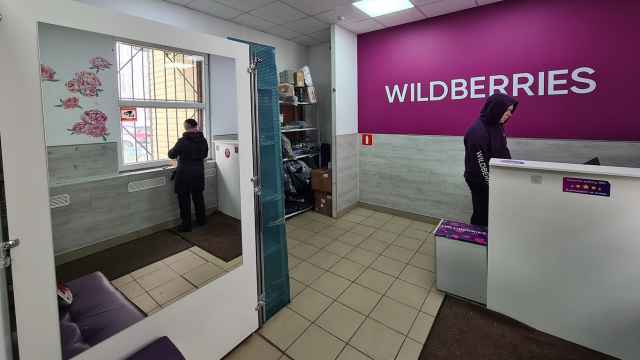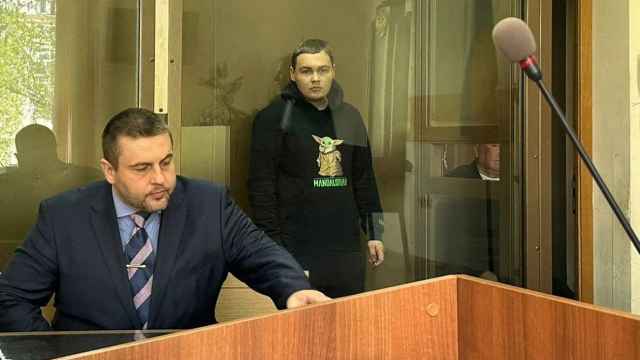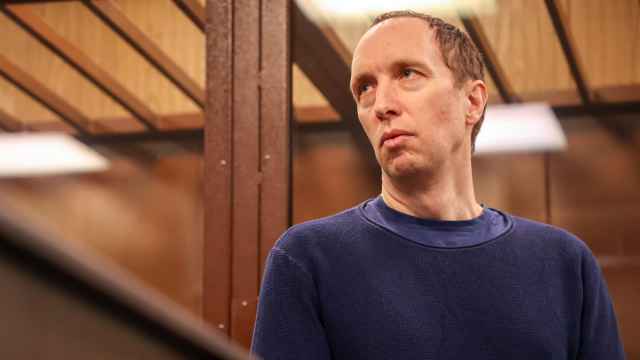An ultranationalist activist has called upon Russians to travel to Ukraine to "take up weapons" and "shed blood" to fight the government across the border, after having been kicked out of Ukraine for trying to incite ethnic unrest.
Anton Rayevsky, a member of Russia's ultranationalist group Chyornaya Sotnya, or Black Hundred, was deported by the Ukrainian Security Service after reportedly posing as a local resident at a rally for secession to Russia in Odessa earlier this month, Ukrainian news agency UNIAN reported.
In a video posted on YouTube on Sunday after his return to St. Petersburg, Rayevsky said Russian nationalists "are not only ready to participate in protest marches against the Kiev junta, but also to take up weapons."
"We are ready to shed blood and we will shed it — the blood of our enemies," he said.
Rayevsky also said that Ukrainian officials at railway border checkpoints were reluctant to let military-age Russian men into the country, presumably in response to Russian nationalists' calls on social networks for young men to travel to Ukraine and join "resistance" groups in Russian-speaking regions across the border.
"I broke that blockade, I have demonstrated that Russian nationalists, Russian volunteers are willing to go, and are going, into Ukraine to defend the interests of not only the Russian-speaking population but also — let's call things by their proper names — of the Russian people," Rayevsky said.
The video of Rayevsky — who sports tattoos of a swastika and Nazi slogans on his arms — shows him sitting at a desk with an arrangement of Russian Orthodox icons behind him, and a picture of a Kalashnikov automatic rifle on a computer monitor.
One of the tattoos on Rayevsky's arms says: "Jedem das Seine" — a German phrase meaning "to each his own," which was inscribed on the gate of the Buchenwald concentration camp.
Another tattoo says: "Blut und Boden" — the German for "blood and soil," a slogan that was popularized by Nazi ideologists as part of a program of systematic ethnic persecution, and used as the Agriculture Ministry logo during the Third Reich.
"Not only in Ukraine, but also here, in St. Petersburg, those who support the Kiev junta will get their due," he said.
He also called for Russia to dispatch troops into eastern and southern Ukraine to annex those territories as well.
The Ukrainian Security Service, or SBU, accused Rayevsky of attempting to create a "subversive" group in Odessa during his stay there and to provoke ethnic conflicts between Odessa's Russian and Ukrainian residents. The SBU also accused Russian security services of having orchestrated the effort.
After Ukrainian media published photographs of the March 23 rally in Odessa, Facebook users identified Rayevsky in several of the pictures, Odessa's local news website Dumskaya.net reported.
The ultranationalist, who had been staying at a tent camp outside Odessa after his arrival on March 19, was also training pro-Moscow nationalists in close combat.
"Have been met by fighters from the Odessa brigade, brought to the Kulikovo Field, where a military patriotic camp is located," Rayevsky said on his VKontakte social network page on March 19. "I was immediately handed out a shield, a bat, a bulletproof vest... Everything was as I expected."
The comment appeared to have since been removed from Rayevsky's VKontakte page, but is still accessible in Google cache records.
Over the past month, viewers have reported several people being featured repeatedly in Russian state-run television newscasts — often middle-aged women speaking Russian without an Ukrainian accent — appearing as supposedly Ukrainian pro-Russian activists in various cities throughout Ukraine.
"Ukraine is full of twins," journalist Yekaterina Bolotovskaya said in a Gazeta.ru article on March 10 about the coverage of the crisis by Russian media.
Black Hundred leader Alexander Shtilmark said that about eight other members of his organization are in southern Ukrainian regions, but insisted that their only goal is to "protect residents from nationalist" Ukrainian organizations, Fontanka.ru reported.
A poll by the Levada Center released on Sunday showed that 23 percent of Russians thought a war with Ukraine was likely, and three out of four Russians would support their government if such a war were to break out.
A Message from The Moscow Times:
Dear readers,
We are facing unprecedented challenges. Russia's Prosecutor General's Office has designated The Moscow Times as an "undesirable" organization, criminalizing our work and putting our staff at risk of prosecution. This follows our earlier unjust labeling as a "foreign agent."
These actions are direct attempts to silence independent journalism in Russia. The authorities claim our work "discredits the decisions of the Russian leadership." We see things differently: we strive to provide accurate, unbiased reporting on Russia.
We, the journalists of The Moscow Times, refuse to be silenced. But to continue our work, we need your help.
Your support, no matter how small, makes a world of difference. If you can, please support us monthly starting from just $2. It's quick to set up, and every contribution makes a significant impact.
By supporting The Moscow Times, you're defending open, independent journalism in the face of repression. Thank you for standing with us.
Remind me later.






